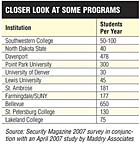
Professor Greg Allen of Bellevue University sees diversity and the growth of technology as two areas that have changed the security profession and impacted degree programs.
From day one, people have had a fascination with the causes and the prevention of crime. Theories have come and gone, and some have come back again and again.
Italy’s Cesare Lombroso, influential in the 19th Century, dissed the so-called Classical School, which believed crime was just part of human nature. Lombroso’s theory: criminality was inherited. A person “born criminal” could be IDed by physical defects. Welcome to phrenology, in which people and the police would study bumps on a person’s head to identify a criminal.

While degree students have myriad reasons for attending class, all share a commitment to improve the profession and their service to it. Pictured: Chuck Thiele; Lt. Debra Johnson, retired, California Department of Corrections; Professor Greg Allen; and Gordon Brown, training officer, Douglas County Youth Center.
Still the fastest growth centers on programs about security management, homeland security and computer security.
Security Magazine, with the help of industry research firm Maddry Associates, sent inquiries to more than three hundred educational institutions to determine if they offer security degree programs in the related areas of criminal justice and security management. The chart, part of this cover article, is not intended to be a complete listing. If you know of a college or university that should be listed, please e-mail the information to Security Magazine’s Editor atzaludb@bnpmedia.com.
But there is no doubt that more institutions offer bachelor, masters, doctorate
and specialized certificates in security and criminal justice.
One example of degree growth is Bellevue University. When the Omaha-based institution first started offering degree programs in security management, it was one of only a handful of colleges offering such programs to a limited number of students. Today Bellevue University has more than 650 students enrolled in its diverse programs.
Professor Greg Allen, director of the security management program at Bellevue, teaches many of those enrolled in the two undergraduate and four graduate degree programs in the areas of security management, information security management, computer information systems with a concentration in security and the college’s most recent security degree program,
investigations.
Unusual for some instructors, Allen has 25 years of law enforcement and private security experience prior to joining Bellevue University.
Many of the degree programs listed are developed for individuals already working in the security industry. Most often master's degree programs emphasize a leadership style and expertise.

Program attendance varies but so do the types of students who enroll in security management, criminal justice and homeland security degree programs.
A Total Package
“It’s important to look for a program that goes full circle. Risk analysis, security methods, security management, ethics, fundamentals of homeland security, issues in security management,” Allen said. Graduate program are even more in depth. “We see many second career people,” he added. Some individuals enter into criminal justice, security management and homeland security degree programs because their employer requires it for a job or for a promotion.“We also see security directors in our programs,” he said. “With a security management degree, there is increased visibility that only helps that person’s program and company relationships.”
At Bellevue and some other educational institutions, students have worked on projects that have impacted the industry and the nation.

“We sent the plan to Michael Chertoff, and have seen some of the recommendations enacted. I don’t know if one thing led to another, but it was encouraging to know the students were on the right track,” said Professor Allen.
In another project, master’s degree students designed and conducted a multi-jurisdictional tabletop exercise demonstration. Here role players simulated key positions within an emergency operations center working to coordinate local emergency responders, make critical decisions and integrate external assets necessary to save lives and protect public health during the first 24-48 hours after the incident. It was the results of this exercise that earned these students an invitation to present an advanced education seminar to attendees of last year’s ASIS International in San Diego. The students were Robert Kizzire, Donald Crider, Michael McClellen, Michael Mulligan and Wes Latchford. Two of these students are currently in the military, another works in security for a defense contractor and the other two work in security for private corporations.

A number of institutions offer degree programs in criminal justice, security management and security administration. This chart is based on a survey of colleges and universities that have responded. It is not intended to be a complete listing. If you know of a program that should be listed, e-mail zaludb@bnpmedia.com and the editors will add confirmed information to the Security Magazine Web listing.
At Texas A&M, for example, there’s a wide range of courses that help advance a student’s knowledge of homeland security issues. It is developing a master's degree program in homeland security to encompass myriad areas including agriculture, public health, urban planning and many others.
At Northwestern University, the going-forward emphasis is on information systems security management. Program developers there said that what is emerging is a “multi-faceted individual” combining risk manager, security strategist and technologist, who can also interact with physical security.
At Rutgers University, the Center for the Study of Public Security offers a multi-disciplinary approach bringing together terrorism, policing, globalization, Constitutional rights, law, environmental safety, business and public health.




